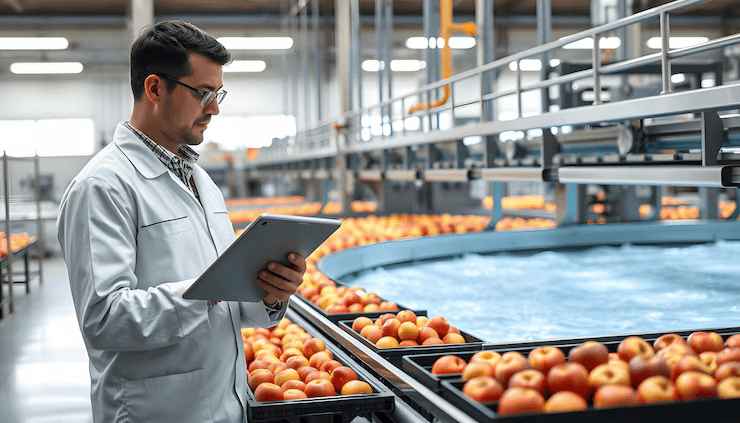What Are Tailored Odoo ERP Solutions for Food Processing Units?
Customised enterprise systems created especially to meet the requirements of food processing facilities are known as tailored Odoo ERP solutions. These systems provide a centralized platform for batch tracking, quality control, manufacturing lines, inventory, compliance documents, and more. Customised solutions, as opposed to off-the-shelf software, meet the particular processes, legal restrictions, and traceability standards of the food sector.
These solutions assist food processors in minimising waste, guaranteeing food safety regulations, and streamlining daily operations. Businesses can modify the ERP system to meet their specific production processes, labelling needs, expiration tracking, and health laws by using an odoo customization service. This method offers full traceability and quality assurance throughout the manufacturing lifecycle in addition to improving operational efficiency.
Essential Modules of Odoo ERP That Streamline Food Manufacturing Processes
Inventory Management Module: Tracks raw materials and finished goods with real-time stock updates. Supports barcode scanning, expiry tracking, and multi-location warehousing—critical for managing perishable items.
Manufacturing Module (MRP): Handles batch production, work orders, routing, and bills of materials. It helps optimize scheduling, reduce downtime, and improve overall productivity in food processing.
Quality Control Module: Allows for quality checks at every stage of production. Helps enforce HACCP guidelines and other food safety standards through automated inspections and alerts.
Lot and Serial Number Tracking Module: Enables end-to-end traceability of ingredients and finished products. Essential for recall readiness and compliance with food safety regulations.
Compliance and Document Management: Stores food safety documents, audit trails, and compliance certificates in a centralized location. Ensures easy retrieval during inspections or audits.
Sales and Purchase Management Module: Manages supplier relationships, procurement planning, and sales cycles. Ensures timely sourcing of ingredients and effective delivery to customers.
Benefits of Custom Odoo ERP Development for Food Industry Efficiency
Batch Traceability: Custom ERP allows full tracking of each production batch, from raw material intake to finished goods. It supports transparency and quick response during recalls.
Regulatory Compliance: Automated documentation and workflows ensure compliance with food safety laws like FSSAI, FDA, and ISO 22000. Reduces the risk of non-compliance penalties.
Real-Time Inventory Visibility: Live inventory dashboards help reduce overstocking or stockouts. This is crucial for managing perishable products and avoiding unnecessary waste.
Optimized Production Planning: Tailored ERP aligns with specific production cycles. It improves machine utilization, reduces idle time, and enhances overall throughput.
Automated Quality Checks: Custom quality workflows enforce inspections at critical control points. Ensures only compliant batches are approved for packaging and shipment.
Waste Reduction and Cost Control: Helps monitor ingredient usage, reduce spoilage, and identify process inefficiencies. Leads to more sustainable operations and cost savings.
Improved Supplier and Customer Management: Streamlines procurement and distribution. Enhances relationships through timely order fulfillment and transparent communication.
Key Challenges Faced by Food Processing Units in Batch Control and Compliance
Lack of Real-Time Batch Monitoring: Manual tracking methods often lead to batch errors, production delays, and traceability gaps, especially during audits or recalls.
Regulatory Complexity: Complying with multiple regulations across different markets (like FDA, FSSAI) can overwhelm food processors without an automated system.
Ingredient Expiry and Spoilage: Without real-time inventory tracking, businesses face frequent losses due to expired or improperly stored raw materials.
Inconsistent Quality Standards: Manual quality checks lack consistency, leading to variability in product output and risking brand reputation.
Disjointed Production Processes: Using multiple standalone tools causes poor data flow and inefficiencies across departments like procurement, production, and sales.
Recall Management: Without proper lot tracking, identifying affected batches during a recall becomes time-consuming and risky for food safety compliance.
Audit Readiness and Documentation: Maintaining up-to-date compliance documents and batch records manually makes audits stressful and error-prone.
How to Get Started with Odoo ERP Customization for Your Food Processing Unit
Understanding your food processing operations, regulatory needs, and operational pain areas is the first step in implementing Odoo ERP. Choosing the appropriate modules, such as manufacturing, inventory, and quality control, that complement your production cycle is the next stage. For the best planning, a comprehensive requirements analysis aids in mapping existing issues to Odoo’s capability.
You can tailor the ERP to your particular requirements by collaborating with a knowledgeable odoo customization service provider. Everything may be customised to fit your operations, from setting up lot tracking and quality control procedures to building up workflows for regulatory documentation. With expert assistance, you can minimize training time, guarantee a seamless ERP installation, and scale with confidence with a reliable, compliant system that grows with your food company.
 :
https://in.pinterest.com/bizoplesolutions
:
https://in.pinterest.com/bizoplesolutions

